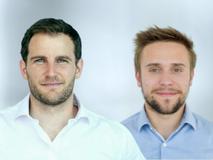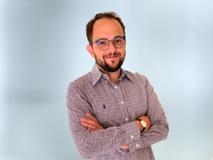Startups developing the first mechanistic-based microbial product to treat Infant Colic, a connected sensors-mounted helmet, massed recording of Electroencephalography data, big data driven soil health assessment, and solutions to convert CO2 into Oxygen
09.07.2021
BactoKind, Bearmind, braincredible, and OXI-ZEN win Venture Kick's first stage of financial and entrepreneurial support. Their projects help reduce the amount of gas produced in the intestine of colic babies, helping team managers make informed decisions about players' health and broaden the knowledge of brain damage in contact sports, remove any barrier to the exploitation of big brain data by allowing its customers to own data, enable Co2 emitters and Converters to directly interact and transfer economic value.
 |
 BactoKind CEO Vanesa Natalin Rocha Martin
|
 Bearmind CEO Mathieu Falbriard and COO Tom Bertrand
|
 braincredible CEO Andrea Biasiucci
|
 OXI-ZEN CEO Christopher Mbanefo, CTO Jithin VG, and Advisors John Harris and Ameenah Gurib-Fakim
|
BactoKind: the first mechanistic-based microbial product for the alleviation of Infant Colic.
Colic babies experience prolonged and inconsolable crying, which affects the infant's and parents' life. Infant Colic (IC) affects up to 20% of infants younger than three months. There are currently no products with proven efficacy on IC alleviation.
CEO Dr. Vanesa Rocha Martin, Pioneer Fellow ETH, Research Assistant and support in R&D Veronica Zimmermann, Prof. Ing. Christophe Lacroix - Head of the Food Biotechnology Lab ETH, and Prof. Dr. Christian Braegger - Head Gastroenterology and Nutrition - Children's Hospital Zurich (KISPI) are developing BactoKind based on a strong scientific background and data built on more than 12 years of research on infant gut microbiota by the Food Biotechnology Laboratory - ETH Zürich and in collaboration with the Gastroenterology and Nutrition Unit - KISPI. Their studies involving infant cohorts, animal and in vitro models, provide scientific evidence on the role of the gut microbiota metabolism as a cause of IC. Their goal is to develop the first mechanistic-based microbial product for the alleviation of IC. They have identified two bacterial strains that can reduce the amount of gas produced in the intestine of colic babies. Reducing gas production leads to less bloating, less pain, and less crying. BactoKind will be commercialized as a food supplement in the form of drops and supplemented infant formula. The potential market for BactoKind, accounting EU, USA, China, East Asia, and Brazil is estimated at over USD 1.3 billions.
The Venture Kick funds will be used to pay the website development and first scale-up pilot trials.
Repetitive brain impacts, frequent in contact sports, were shown to have harmful and long-term consequences for the brain. Recent medical studies suggested that the damages already occur with small but repetitive impacts to the head, common to all contact sports. Due to the lack of reliable devices, there is today little evidence about the amount, and the severity of head impacts athletes endure during a season, making concussions the only indicator of an already damaged brain.
Both Bearmind's co-founders Mathieu Falbriard, Ph.D. LMAM-EPFL and Tom Bertrand, MSc Civil Eng. EPFL, are currently working with the Laboratory of Movement Analysis and Measurement (LMAM) via the EPFL Ignition Grant. The current advisers are Prof. Kamiar Aminian (LMAM-EPFL), Benoît Mariani, Ph.D., Co-founder of GaitUp, and Christophe Guberan, industrial designer, Part-time prof. at ECAL, Lecturer at MIT. They propose a new system composed of a sensors-mounted helmet, state-of-the-art post-processing algorithms, and an online platform to provide real-world analysis of head-impacts in helmet sports. The sensors will record the head's motion using inertial sensors and the location and severity of the impact through foam-integrated pressure sensors. With such a system, head-impacts will be accurately characterized, helping team managers make informed decisions about players' health and broaden the knowledge of brain damage in contact sports. This can significantly reduce the risk of concussion and long-term brain damage by detecting early risk conditions. In addition, it provides data from the field back to the manufacturer’s lab, allowing them to understand how their products are used in the real world. The estimation of the global cost of injuries, per year, in American contact sports is estimated at over USD 20 billion for College and High school. In a study from 2017, among the four types of injuries considered, concussion had the highest prevalence. Eager to reduce rehabilitation costs, professional sports federations/clubs started to spend hundreds of millions to address this issue.
The Venture Kick stage 1 would help them in the initial business development phase. They identified and intend to meet with multiple medical institutions, at least 5 in Switzerland, about 24 professional hockey clubs, and 12+ helmet manufacturers in Switzerland and abroad.
braincredible: removing any barrier to the exploitation of big brain data
Electroencephalography (EEG) is a consolidated brain imaging technique used in some of the most successful proofs-of-concept in neuroscience and neurotechnology to date. Despite these technical and early clinical successes, the scarce access to brain data and the complex logistics of EEG recordings limit the impact of these technologies. braincredible – a neurotechnology startup based in Sion – aims to remove any barrier to the exploitation of big brain data by allowing its customers to own data, not hardware. braincredible develops new technology and services that allow the massed recording and analysis of EEG data, including real-time machines and Artificial Intelligence. braincredbile's founding team is composed of Venture Kick alumnus Dr Andrea Biasiucci a former researcher at EPFL and at the Centre Hospitalier Universitaire Vaudois (CHUV) and by ANT Neuro – one of the leading manufacturers of EEG systems in the world. Because of its privileged interaction with ANT Neuro, braincredible is able to offer EEG equipment on a pay-per-use / pay-per-subject basis, representing a massive improvement on traditional payment schemes and paradigms in the field. Clients can order "big EEG deployments" around their physical location, and braincredible will provide the systems, train the local personnel and ensure that the data is correctly collected and stored. Each big deployment has the aim to collect 1000+ subjects.
They plan to use the Venture Kick Stage 1 funds to create a professional website and to perform an initial marketing study to assess the potential of the new venture.
OXÏ-ZEN is creating a global platform for an emerging eco-system, in which Greenhouse Gas (GHG) Emitters and Sequestrators (Convertors) can connect worldwide and transact directly, efficiently with no third party involvement. Public/Private organizations, corporations, and people can transparently sequester their carbon footprint, scientifically verified using latest satellite data, algorithms and AI, together with in-situ soil testing, with independent audits.
Custodians of forests and large bodies of water, anywhere on the planet can connect with the global economy and be directly compensated for their valuable service. This allows Convertors to achieve their SDGs, while enabling Emitters to fulfill their CSRs and meet ESG criteria of investors.
OXÏ-ZEN was founded by Christopher Mbanefo, MSc Aerospace Eng. and professional pilot, and includes an impressive international scientific team which includes collaborations with RESTOR (ETHZ & GOOGLE), The Crowther Lab / ETHZ, Bermuda Institute of Ocean Science, ACCUBITS (leading global developer in Blockchain technology). OXÏ-ZEN has diverse Strategic Global Advisors, and an expanding team of Ambassadors active in Africa, Asia, Central America, Carribean, and has secured over 18m hectares of terrestrial and marine carbon sinks. OXÏ-ZEN is a member of the SBTI (Science Based Target Initiative) and the Fossil Fuel Non-Proliferation Treaty Initiative.
The overall global market is estimated at over +USD 250 billion, with the Voluntary Carbon Market expanding and playing an increasingly important role. With just 1% of the market, OXÏ-ZEN would generate an annual trade volume of over USD 2 billion.
They plan to use the Venture Kick Funds to help with the final Roll-Out of their Blockchain platform later this year.


